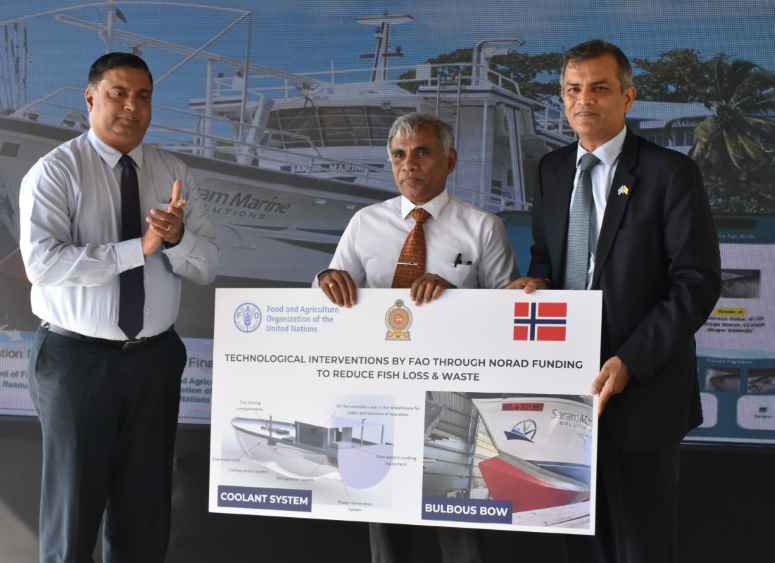
25 October 2024, COLOMBO – The Food and Agriculture Organization of the United Nations (FAO), with funding from the government of Norway, has taken a significant step toward enhancing resilience and sustainability in Sri Lanka’s fisheries sector by handing over a multi-day fishing boat equipped with advanced cooling technology and a fuel-saving bulbous bow. This initiative promotes the adoption of new technologies to reduce post-harvest losses, lower operational costs, and improve the quality of fish for both local and export markets.
Enhancing Resilience through Advanced Cooling Systems
Sri Lanka’s multi-day fishing vessels, essential for deep-sea fishing, especially in the tuna export industry, often rely on ice to preserve fish during long voyages. However, this practice frequently compromises quality, leading to post-harvest losses. The Fish Loss and Waste (FLW) Assessment conducted by FAO in 2022–2023 found an average quality loss of 41.4% in the catch from Sri Lanka’s multi-day fisheries.
To address this challenge, FAO has installed an advanced cooling system on a newly constructed multi-day fishing vessel to ensure fish are kept at optimal temperatures throughout the voyage. This technology strengthens the resilience of fishing operations, ensuring higher-quality fish products reach the market while reducing waste and spoilage.
Boosting Efficiency with Fuel-Saving Bulbous Bow Technology
Fuel efficiency is critical for Sri Lanka’s fisheries sector, as multi-day boats consume between 8,000 and 11,000 liters of diesel per trip, costing operators 3 to 4 million LKR per voyage. To ease this burden, FAO provided technical expertise for the installation of bulbous bow technology on the vessel. This innovation minimizes wave resistance, delivering a 13% reduction in fuel consumption.
This innovation not only helps offset the additional fuel required by the cooling system but also brings long-term economic benefits to boat owners. The cost of installing the bulbous bow—approximately 1 million LKR—was borne by the boat owner with FAO’s technical support, highlighting the private sector’s role in adopting sustainable practices.
Empowering Fishermen with AI-Driven Quality Assessment Tools
A key challenge faced by fishermen is securing fair prices for their catch. Middlemen often exploit gaps in quality knowledge, leaving fishermen with reduced profits. To address this, FAO developed an AI-powered mobile app, enabling fishermen to assess the quality of their fish in real-time based on Yellowfin Tuna export standards.
The app provides immediate feedback through a simple photo upload, giving fishermen the power to negotiate better prices. This tool enhances the resilience of fishing communities by ensuring more equitable market access and fairer pricing.
These initiatives, handed over to the Department of Fisheries and Aquatic Resources, is part of FAO’s broader commitment to build resilience in Sri Lanka’s fisheries sector by promoting sustainable practices, reducing post-harvest losses, and empowering fishing communities. By integrating modern cooling systems, fuel-efficient technologies, and AI-based tools, FAO is driving a transformation that supports the economic and environmental sustainability of the sector.



